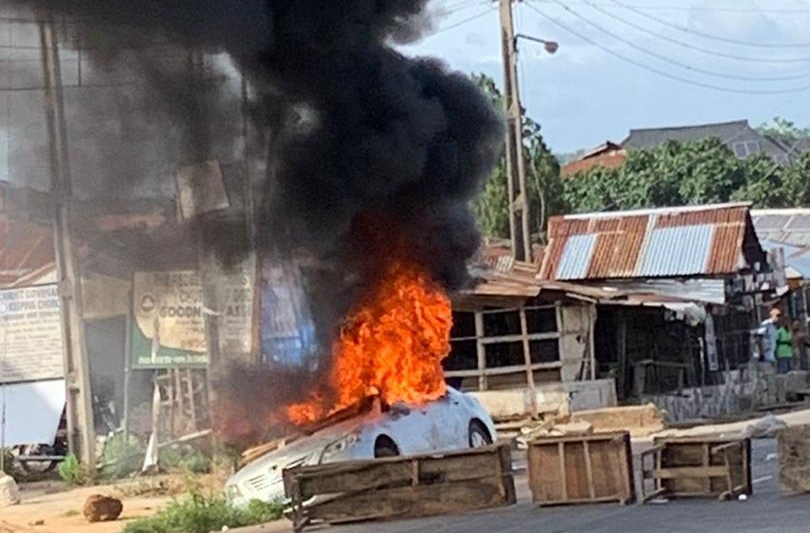Why Nigeria not free from cholera yet
By Babatunde Ayedoju
|
There are many diseases that ravage human societies, Nigeria inclusive. Some are commonly known while there are others that only few people are aware of. One of such diseases is cholera, a disease that was first discovered in Nigeria in the early 1970s.
The Nigeria Centre for Diseases Control (NCDC) described cholera as an endemic and seasonal disease that occurs annually, mostly during the rainy season and more often in areas with poor sanitation. It is a very contagious disease that occurs in environments without clean water and proper sanitation.
Unfortunately, this deadly disease that causes profuse diarrhoea, vomiting and death by intense dehydration, if left untreated, has been grossly underreported, according to the News Agency of Nigeria (NAN).
According to NAN, cholera is not only notoriously underreported, reliable global figures about the number of cases are not available. The best estimates are between 1.5 and 4 million cases every year, as stated by Doctors Without Borders, also known as Médecins Sans Frontières (MSF).
In its latest weekly Cholera situation report for weeks 44–47, via its official website, the NCDC cited this trend of poor and inconsistent reporting of cholera cases from states as one of the major impediments to the country’s response to the disease outbreak.
The NCDC said that at the moment it is tackling cholera outbreaks in 32 states and the Federal Capital Territory (FCT). It added that a total of 583 deaths were recorded due to cholera, while 23,550 people were suspected to have been infected with the disease between January and November 27, 2022.
According to the centre, suspected cases of cholera had been reported across 270 local government areas in the 32 states and the FCT. The NCDC also said that of the suspected cases since the beginning of 2022, the age group 5–14 years was the most affected; 49 per cent were males, while 51 per cent were females.
The report says, “32 states and the FCT have reported suspected cholera cases in 2022. These are Abia, Adamawa, Akwa Ibom, Anambra, Bauchi, Bayelsa, Benue, Borno, Cross River, Delta, and Ekiti. Others are: FCT, Gombe, Imo, Jigawa, Kaduna, Kano, Katsina, Kebbi, Kogi, Kwara, Lagos, Nasarawa, Niger, Ondo, Osun, Oyo, Plateau, Rivers, Sokoto, Taraba, Yobe, and Zamfara.
“In the reporting month, six states reported 1,393 suspected cases: Borno (1,124), Gombe (165), Bauchi (61), Katsina (16), Adamawa (14), and Kano (13).
“There was a 78 percent decrease in the number of new suspected cases in November Epi weeks 44–47 (1393), compared with October Epi weeks 40–43 (6306).
“In the reporting week, Borno (24), Gombe (14), Bauchi (13), Kano (5), Katsina (1), and Adamawa (1), reported 58 suspected cases.
“Borno, Gombe, and Bauchi states account for 88% of the 58 suspected cases reported in week 47.
“During the reporting week, two Cholera Rapid Diagnostic tests were conducted in Gombe 2 (100% positive).
“Two stool culture tests were conducted from Gombe, 1(100 percent positive) and Bauchi 1(0 percent positive) in epi week 47.
“Of the cases reported, there were two deaths with a weekly case fatality ratio (CFR) of 3.4 per cent,” it said.
The Public Health Agency said that there were no new state-reported cases in week 47. It, however, said that the National Multi-Sectoral Cholera Technical Working Group continued to monitor response across states.
It added that six states: Borno (1,2459 cases), Yobe (1,888 cases), Katsina (1,632 cases), Gombe (1,407 cases), Taraba (1,142 cases), and Kano (1,131 cases) —account for 84 per cent of all cumulative cases and 15 LGAs across five states Borno (7), Yobe (4), Taraba (2), Gombe (1), and Zamfara (1)—reported more than 200 cases each this year.
The alarming statistics above show that Nigeria may not be free from cholera yet, as there are more cases being recorded regularly, except that they are underreported.
The nationwide public health agency stated that the difficulty in accessing some communities as a result of insecurity, open defecation and poor hygiene also contributed to the surge in the disease.
The NCDC equally blamed the hinderances in tackling cholera on inadequate health facility infrastructure, medication for the management of patients and inadequately trained personnel in states for case management.
In the words of Dr Adesina Akintan, Physician-in-Charge of University of Medical Sciences Teaching Hospital, Akure Complex, Nigeria has never been free from cholera. The seasoned physician blamed the prevalence of the communicable disease on poor hygiene both among individuals and in communities.
He, therefore, disclosed that provision of potable drinking water, hygiene and proper disposal of waste would in no small way help to stem the tide of cholera outbreak in Nigeria. He also stressed the need to address open defecation which he described as a big issue in Africa, being a key factor contributing to lack of hygiene in the society.
Akintan, while emphasising the need for mass media to educate the public adequately about how to fight cholera, added that everybody had a role to play in eradicating the disease, including leaders at every level in the society.
According to Oluwatoye Buraimoh, a biochemist who works for a pharmaceutical firm, Nigeria is not totally free from cholera yet. He said that Nigeria’s healthcare system would continue to deal with a so-called eradicated disease from time to time, making whatever data claim false.
The biochemist recommended that the government could make policies to arrest the root cause of cholera which is the causal organism and its mode of transmission. He added that the media could do its best to report any case of an outbreak, so as to make the populace aware of it and take measures to prevent its further spread.
Buraimoh added that healthcare workers should with due diligence quarantine every case and take out isolated tests on the environment where it was discovered. He also said that the populace should ensure to adhere to the policies by the government, prevention methods and routine response that should be given by the Healthcare providers through the media.
In the words of Kayode Ogunmola, a microbiologist, Nigeria is not free from cholera. While explaining that cholera thrives mostly in an environment that is not properly sanitised, and that there is insufficient data on its distribution, Ogunmola said, “If you look at Nigeria, especially the rural areas, you will see that sanitation has not been properly adhered to. Consequently, we have many people suffering from cholera who are off the books. Secondly, we tend to all lose many people and we don’t have enough facilities to cater for them.”
The microbiologist added that for cholera, prevention is always better than cure, as it is with major diseases around the world. He said, “There is an adage that says cleanliness is next to godliness. If people can adhere to rules of hygiene, they will be able to beat cholera to the barest minimum.”
As a way forward, Ogunmola recommended that the government should team up with the media to heighten campaigns on the need to practise personal and community hygiene, saying, “If we can do that, cholera will be beaten down and the work of health practitioners will be made easier.”
Alongside providing more funds for the healthcare industry, equipping healthcare facilities, and sensitising the populace on how hygiene can help fight cholera, Ogunmola suggested that the government should also put in place adequate waste disposal mechanisms, because “in some places, one can still see tons of waste littered along the streets and it shouldn’t be so. These are things that contribute to cholera outbreak.”










